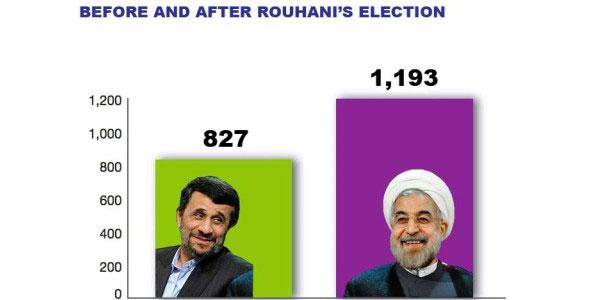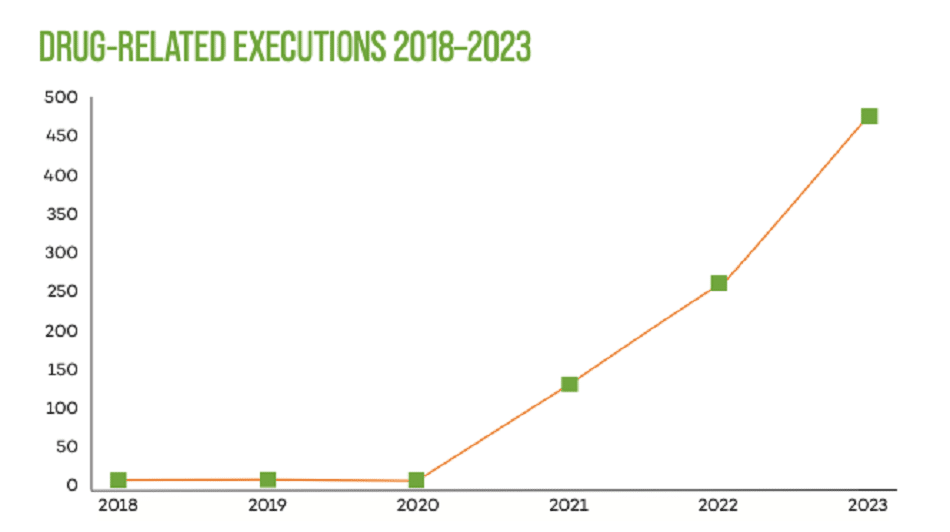
At least 1,193 executions since Hassan Rouhani’s election as president in Iran
MENA
On Tuesday March 12, Iran Human Rights (IHR) and Ensemble Contre la Peine de Mort (ECPM) presented IHR’s seventh annual report on the death penalty in Iran.
Download the PDF version of the full report
Despite the optimism and hope after the election of Mr. Hassan Rouhani as the Iranian president, there are few indications that the human rights situation in the country has improved. In fact, a comparison of the 18 months before and after the presidential elections of June 2013 shows that the use of the death penalty has in fact increased.
Even worse, the number of juvenile offenders executed in 2014 is at its highest annual rate since 1990.
In addition, Iranian authorities continue execution for non-violent civil and political activists. Executions of Arab teachers, Hadi Rashedi and Hashem Shabani, who belonged to an Arabic cultural group called “Al-Hiwar” (dialogue), Gholamreza Khosravi, charged with giving economic support to a banned opposition group and Mohsen Amir Aslani charged with insulting the Prophet Jonah and heresy, are just few examples of this practice. The Iranian Supreme Court upheld the death sentence for Soheil Arabi, for insulting the Prophet on Facebook and he remains in danger of execution.
Government responsibility for public executions
According to the Iranian constitution, the government, led by the President, doesn’t have the authority to issue and implement executions. The judiciary is the body directly involved.
However, public executions seem to be the exception to this rule. The government (represented by the local governor) does have the authority to decide whether an execution should be carried out in public or not.
For example, in 2014, the governor of the Sistan and Baluchistan Province (Southeastern Iran) had initially disagreed with the public execution of three alleged terrorists in his province. This decision was later changed (possibly due to political pressure) and the prisoners were hanged in public.
This means that although the judiciary makes the initial decision of carrying out the executions in public, the government, if willing, can in fact prevent public executions. Therefore, the government, led by the President, is equally responsible for the high numbers of public executions in Iran.
Presidential influence on the use of the death penalty
Although we have observed a slight decrease in the number of public executions, Iran is among the very few countries that implement public executions. In fact, Iran is, together with Saudi Arabia, on top of the list of countries implementing public executions.
On the other hand, there is an increase in the total number of executions during the presidency of Hassan Rouhani. Although the judiciary, and not the government, have the authority to issue and implement death sentences, nor the President or his government representatives have even once criticized the high number of executions in Iran.
It seems that Mr. Rouhani’s government is not preoccupied with the issue of the death penalty. However, this can be changed if the countries involved in a dialogue with Iran put it on the agenda. The government is normally the counterpart in the dialogue between Iran and the international community.
High-level meetings
In 2014 there have been high level meetings between the Iranian authorities and governments of many Western countries. In addition to visits by hundreds of lawmakers and politicians from the Western countries, top EU officials and foreign ministers of several countries including Norway, Sweden, Italy, Spain and Austria have visited Tehran. Dozens of high level meetings involving Iranian leaders have taken place on the international stage.
In spite of this level of engagement, the data collected by Iran Human Rights (IHR) and published in this report show that the number of executions conducted in 2014 is the highest in more than 15 years.
This report raises the question whether the use of death penalty has been an issue in the bilateral dialogue between Iran and the countries which are the main promoters of abolition of the death penalty on the international scene. If the death penalty is an important issue in these talks, why are the execution numbers rising at the same time as the diplomatic relations are increasingly flourishing? And more importantly, what specific measures are the international community going to take in order to counteract this trend?
Death penalty should be diplomats’ top priority
Commenting the report Mahmood Amiry-Moghaddam, the director and spokesperson of IHR said, “Despite the improving relations between the international community and Iran, the situation of the death penalty has deteriorated significantly during the presidency of Hassan Rouhani. This trend cannot continue. Restriction of the use of the death penalty must be one of the top demands in any dialogue between the international community and Iran. It is time to show that human rights also benefit from these dialogues.”
The present report is being published just days before adotion of Iran’s UPR at the Human Rights Council (HRC) where Iran will be responding to more than 290 recommendations, among them 39 specific recommendations on the death penalty. At the same time, public opposition to the death penalty is increasing inside Iran. There is an ongoing open debate on the issue of public executions.
Further, some Iranian officials have indicated a need for change in the Anti-narcotic Law in order to decrease the execution numbers for drug-related offences. Further change in the legislation regarding the death penalty for juvenile offenders has also been mentioned. At the same time, a forgiveness movement is forming in Iran, where the families of the murder victims increasingly denounce the use of the death penalty as punishment.
Raphaël Chenuil-Hazan, the executive director of ECPM said, “Diplomatic relations and the UPR are good opportunities to improve the situation of the death penalty in Iran. But it demands a stronger will from the international community and Iran’s dialogue partners, particularly the European Union and its members.”
Extend special rapporteur’s mandate
IHR and ECPM believe that extending the mission of the UN Special Rapporteur on human rights in Iran, close monitoring of the UPR recommendations accepted by Iran, conditioning further improvement of the relations with Iran on a reduction in the use of the death penalty and strengthening the Iranian civil society struggling against the death penalty, are the means by which the international community can contribute to restriction of the death penalty in Iran.
IHR and ECPM further believe that abolition of the death penalty for juvenile offenders, public executions and death penalty for drug-related offences are the areas where significant progress can be made in 2015.
Categories
Iran (Islamic Republic of)






